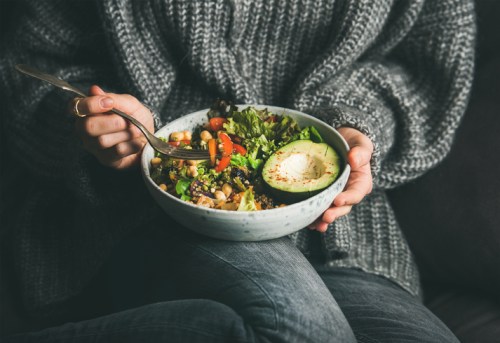Our editors independently select these products. Making a purchase through our links may earn Well+Good a commission
‘I’m a Gastroenterologist, and Here’s Why Beans Make You So Gassy—Plus How To Prevent It’
Here, a gastroenterologist and a dietitian tell all on the age-old question of why do beans cause gas and share tips for prevention.

We try our best not to pick favorites when it comes to the hardworking ingredients that comprise our everyday meals. But despite our concerted effort to be impartial, it can be difficult to not give at least a slight edge to the almighty bean. After all, not only is this popular legume highly nutritious and affordable, but beans also come in many different delicious varieties and can be prepared using a diverse array of techniques.
Experts in This Article
registered dietitian and the founder and CEO of New York Nutrition Group
gastroenterologist and founder of Ventura Clinical Trials
High in protein, fiber, and B vitamins, beans have long been a favorite of functional medicine doctors, dietitians, and everyday consumers alike. But health benefits of beans set aside, we’ll be fair: They do have a reputation for being a key contributor to a gassy lifestyle (at least for a few hours).
To get to the bottom of what really happens to your GI system (otherwise known as your gut) when you eat a whole lot of beans, we chatted with Sabine Hazan, MD, a specialist in gastroenterology, internal medicine, and hepatology and the creator of ProgenaBiome and author of Let’s Talk Sh!t; and Lisa Moskovitz, RDN and author of The Core 3 Healthy Eating Plan, to get a crash course in beans: the good, the bad, and the gassy.
Why do beans cause gas?
“Legumes—including beans—are probably the most notorious gas producers,” says Dr. Hazan. “One reason that beans produce gas is that they contain raffinose and oligosaccharides, which are gas-producing sugars found in many vegetables.” These other vegetables include cabbage, brussels sprouts, broccoli, and asparagus (though beans tend to have the most pronounced effect on the GI system). “Humans, unfortunately, lack the enzyme alpha-galactosidase in our digestive tract, which means that we’re unable to process raffinose. As a result, the compound is fermented by the bacteria found in our gut, which produces—you guessed it—gas,” Dr. Hazan explains.
You’re right to wonder if this side effect happens to everyone. According to the doctor, not necessarily. “Gassy foods are always a popular topic with GI doctors,” says Dr. Hazan. “We all have our list of foods that make it challenging to be around us, but the fact is that everyone processes food differently. What causes gas for some may do nothing to others. It’s individual genetics along with our biomes and hormones that make our farts unique.”
Does this mean that I should avoid beans?
Generally, no. According to the experts, they’re too nutrient-rich to pass up just because of a few extra farts. “Beans are extremely protein- and nutrient-dense and a great source of fiber,” Dr. Hazan tells us. “Adults need 25 to 38 grams of fiber everyday, and most are not even close to meeting that recommendation. Navy beans have 10 grams of fiber per half-cup cooked serving, so eat up! Pinto beans and black beans are also both rich in plant-based protein and fiber and are low in fat. You get satiety—meaning feelings of satisfaction after eating—plus fiber and flatulence all in one food.” What’s not to love?
Moskovitz firmly agrees, and adds that in addition to plant-based protein and fiber, beans are also rich in potassium and magnesium. “Beans such as kidney beans, black beans, and chickpeas are full of soluble fiber that increases metabolites that can boost metabolism and gut health, too,” she adds. While beans are not a complete protein—meaning they do not contain all nine amino acids required for your body to function at peak performance—they come extremely close (and when combined with rice, do indeed make for a complete protein). As such, if you’re looking for an easy, inexpensive way to get your fill of nutrients, beans are the way to go.
Learn more about the health benefits of legumes, including beans and lentils, according to a dietitian:
All of that being said, Moskovitz notes that it’s worth easing into eating beans if your body isn’t used to eating fiber-rich foods or if you have a sensitive stomach. Rather than scarfing down an entire can at breakfast, try incorporating a half cup with lunch or dinner and see how you feel. “While most people benefit from eating a variety of beans, others may notice uncomfortable side effects, like gas pains, diarrhea, uncomfortable bloating, and even constipation,” she says. “This is a result of the fermentable and fiber-rich components of beans that are harder to break down in your body. It all depends on the person. Ultimately, while there is no harm and mostly positives in consuming beans, if you notice uncomfortable side effects, then it may be best to ease them into your diet,” Moskovitz says.
Can you reduce the amount of gas that beans produce?
Believe it or not, Dr. Hazan says you can. “The best way to decrease their gas production is to let your dried beans soak in cold water for eight hours. After they’ve had a soak, drain the liquid and cook your beans in fresh water.” Gassiness, gone (well, lessened…and no promises).
Oh hi! You look like someone who loves free workouts, discounts for cutting-edge wellness brands, and exclusive Well+Good content. Sign up for Well+, our online community of wellness insiders, and unlock your rewards instantly.
Sign Up for Our Daily Newsletter
Get all the latest in wellness, trends, food, fitness, beauty, and more delivered right to your inbox.
Got it, you've been added to our email list.










